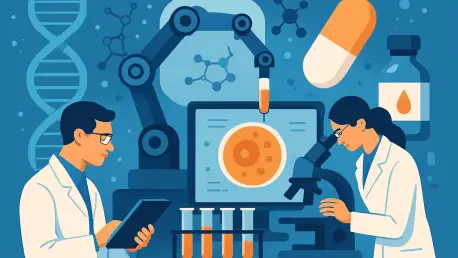We’re sitting down with Ivan Kairatov, a renowned biopharma expert with extensive experience in research, development, and cutting-edge technology within the industry. With a career dedicated to pushing the boundaries of innovation, Ivan offers a unique perspective on how science and tech intersect to shape the future of healthcare. In this conversation, we dive into the challenges and opportunities within biopharma, exploring the impact of emerging technologies, the hurdles of bringing new treatments to market, and the evolving landscape of the industry.
Can you share how you first got involved in the biopharma field and what has kept you passionate about this work over the years?
I’ve always been fascinated by the intersection of biology and technology, and that curiosity led me to biopharma during my university years. I started in a lab focused on drug discovery, and seeing how a single breakthrough could change lives hooked me. What keeps me going is the constant evolution—there’s always a new challenge, whether it’s a novel therapy or a tech advancement like AI in drug design. The potential to impact millions of people with better treatments is what drives me every day.
What do you see as the most significant technological advancements shaping biopharma right now?
We’re in an exciting era with tools like CRISPR for gene editing and machine learning for drug discovery. These technologies are speeding up what used to take decades. For instance, AI can predict how molecules will interact with targets in the body, cutting down trial-and-error time. Meanwhile, gene therapies are tackling diseases at their root cause, not just symptoms. It’s a game-changer, but it also comes with ethical and regulatory questions we’re still figuring out.
How do you think these advancements are changing the timeline and process of bringing new drugs to market?
They’re compressing timelines dramatically. What used to take 10-15 years can now sometimes be done in half that time with predictive modeling and precision medicine. We’re also seeing more personalized treatments, thanks to better data on patient genetics. But speed brings risks—rushing can mean missing long-term side effects. The process is more efficient, yet we’re still balancing that with rigorous safety standards to protect patients.
What are some of the biggest challenges biopharma faces in turning these innovations into accessible treatments for patients?
Cost and scalability are huge barriers. Developing cutting-edge therapies, like gene editing, is incredibly expensive, and that often translates to high prices for patients. Then there’s the issue of manufacturing—how do you produce complex biologics at a scale that meets global demand? Plus, regulatory frameworks haven’t always caught up with the tech, so approvals can lag. It’s a constant push-pull between innovation and practicality.
Can you tell us about a specific project or breakthrough in your career that you’re particularly proud of, and why it mattered?
Early in my career, I worked on a team developing a biologic for a rare autoimmune disorder. It wasn’t a blockbuster drug, but for the small group of patients who had no other options, it was life-changing. Seeing their stories—people regaining mobility or returning to work—reminded me why we do this. It wasn’t just about science; it was about giving hope. That project taught me the value of persistence, even when the odds seem stacked against you.
How do you see the role of collaboration between tech companies and biopharma evolving in the coming years?
It’s only going to deepen. Tech companies bring expertise in data analytics, AI, and digital platforms that biopharma needs to handle massive datasets—like genomic information or real-world patient data. In return, biopharma offers the clinical knowledge to ground those tools in reality. We’re already seeing partnerships on wearable devices for monitoring treatment outcomes. I think the future is in seamless integration, where tech and biopharma don’t just collaborate but co-create solutions from the ground up.
What is your forecast for the future of biopharma, especially in terms of balancing innovation with affordability and access?
I’m optimistic but cautious. We’re headed toward a future where treatments are hyper-personalized, and tech will play a massive role in making that happen. But the affordability piece is the wildcard. If we can’t solve the cost barrier, we risk creating a two-tier system where only some can access these incredible advancements. My hope is that innovations in manufacturing and policy will drive costs down while maintaining quality. It’s a tall order, but with the right focus, I believe we can get there in the next decade or so.









